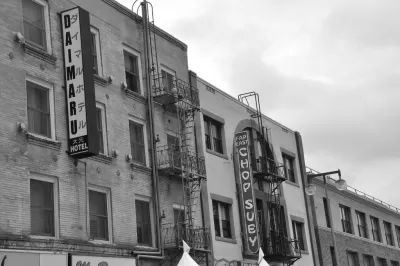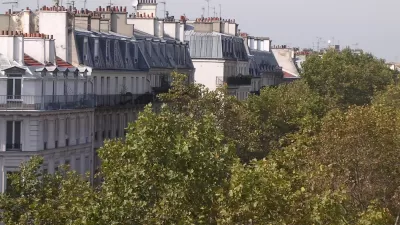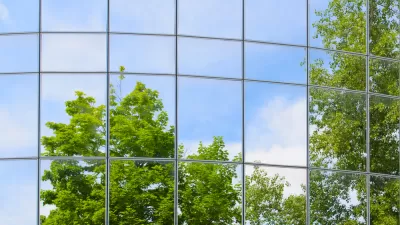Little Tokyo in Los Angeles was selected to be part of the EcoDistrict Target City program. Global Green is excited to be part of this collaborative effort to promote neighborhood scale sustainability and further the concept of "Mottainai."

Thinking sustainably usually means taking the long view, so it is inspiring to see the rapid progress occurring in the burgeoning EcoDistrict movement for district-scale urban revitalization. For the past several years, the Green Urbanism Program at Global Green has been exploring the potential for working at the neighborhood or district scale to accelerate and increase the transformation impacts of green design. Through a variety of green affordable hosing projects, Sustainable Neighborhood Assessments, and LEED for Neighborhood Development certified plans, we are moving towards realizing how "green urbanism"—the practice of creating communities mutually beneficial to humans and the environment—can be manifest.
EcoDistricts' unique contribution to the sustainability conversation is the recognition that green design strategies, standards, and techniques are a part of a larger, more complex picture. Affecting change in a community also means identifying and nurturing local organizations that can help shape the local vision and stay the course in implementation. I saw the importance of this perspective earlier this year as a facilitator at the EcoDistricts Incubator: One of the main insights of the group I worked with was the need to clarify their governance model before launching into revitalization projects. This helps ensure that each organization and individual is able to contribute most effectively to realizing the projects.
Recognition of the critical role played by community organizations is a core aspect of EcoDistricts' Target Cities program, recently announced at the Clinton Global Initiative Denver meeting. A two-year partnership with nine development projects in seven North American cities, Target Cities aims to accelerate district-scale community regeneration and to create replicable models for urban revitalization. The projects are located in Atlanta, Boston, Cambridge, Denver, Ottawa, Washington, D.C, and, most exciting for me, Los Angeles.
Little Tokyo, a 20-acre area in Downtown Los Angeles, is the specific neighborhood selected to represent Los Angeles. Global Green, along with a number of other non-profit and community development groups, has collaborated with Little Tokyo and EcoDistricts for the past year to help shape the overall vision and identify how to implement innovative concepts by bringing our national expertise in green urbanism to project. This includes our participating in the community charrette last October, contributing to an analysis of integrated infrastructure opportunities, and serving as an advisor to Little Tokyo Service Center staff.
We are excited to be able to continue our involvement as a supporter and contributor to the Little Tokyo effort. Being part of the national pool of Target Cities will both help bring best practices to Los Angeles, and also enable the sharing of innovative conceptual work being done in Little Tokyo, built around the cultural and philosophical concept of "Mottainai"—roughly translated to "do not destroy (or lay waste to) that which is worthy.”
Fostering a shift to sustainability takes patience and perseverance, so it is deeply rewarding and exciting to see the significant progress made in both the EcoDistricts movement and on the ground in Little Tokyo. I expect that the Target Cities partnership and the efforts in Little Tokyo will provide a catalyst for future district-scale green urbanism projects in Southern California and nationally.

Alabama: Trump Terminates Settlements for Black Communities Harmed By Raw Sewage
Trump deemed the landmark civil rights agreement “illegal DEI and environmental justice policy.”

Planetizen Federal Action Tracker
A weekly monitor of how Trump’s orders and actions are impacting planners and planning in America.

The 120 Year Old Tiny Home Villages That Sheltered San Francisco’s Earthquake Refugees
More than a century ago, San Francisco mobilized to house thousands of residents displaced by the 1906 earthquake. Could their strategy offer a model for the present?

Ken Jennings Launches Transit Web Series
The Jeopardy champ wants you to ride public transit.

BLM To Rescind Public Lands Rule
The change will downgrade conservation, once again putting federal land at risk for mining and other extractive uses.

Indy Neighborhood Group Builds Temporary Multi-Use Path
Community members, aided in part by funding from the city, repurposed a vehicle lane to create a protected bike and pedestrian path for the summer season.
Urban Design for Planners 1: Software Tools
This six-course series explores essential urban design concepts using open source software and equips planners with the tools they need to participate fully in the urban design process.
Planning for Universal Design
Learn the tools for implementing Universal Design in planning regulations.
Clanton & Associates, Inc.
Jessamine County Fiscal Court
Institute for Housing and Urban Development Studies (IHS)
City of Grandview
Harvard GSD Executive Education
Toledo-Lucas County Plan Commissions
Salt Lake City
NYU Wagner Graduate School of Public Service





























